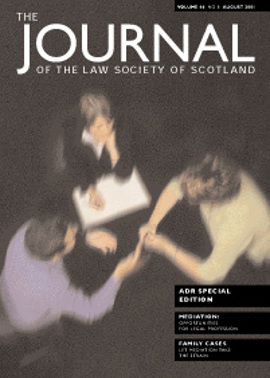European opinion on MDPs
Advocate General Léger of the European Court of Justice gave his opinion on 10 July 2001 in the NOVA case (C-309/99 Wouters). These were long-awaited conclusions in a case which should have a significant impact for legal professions across Europe.
The case itself stems from a dispute between Price Waterhouse and Arthur Andersen & Co., and the Dutch Bar Association (“NOVA”) and relates to whether the Dutch Bar Association can regulate its profession in such a way as to prevent lawyers and accountants from setting up multi-disciplinary partnerships. The two accountants firms had claimed that such a prohibition is anti-competitive and contrary to EC law.
The Amsterdam court making the reference to the ECJ had ruled that such a ban is a restriction on the freedom to provide services but that it is, however, justified in the public interest. An oral hearing on the case was held in mid-December 2000 and the Advocate General, Philippe Léger, delivered his Opinion in July this year.
Competition
One of the areas principally under consideration in this case was the question of whether EC competition law applies to the Bar Association’s rules and, if so, whether these rules could be deemed to be anti-competitive. Mr Léger found that NOVA is, in competition terms, an association of undertakings, as it is exclusively composed of members of the professions who undertake economic activities, and its decisions do not need to be taken in the public interest. This corresponds to the Advocate General’s opinion in another case presently under consideration by the ECJ (C-35/99 Arduino) on fixed fees for work carried out by lawyers in Italy.
It had been argued during submissions to the Court that NOVA itself does not carry on an economic activity and is an organisation which is governed by public law and has a public interest which is linked to the administration of justice. Mr Léger dismissed these arguments stating that:
- ECJ case-law has established that competition rules will apply where the undertakings affiliated to an association carry on the economic activity; and
- the association is composed only of private economic bodies, and the public authorities had not reserved the right to interfere in their decision-making process.
Although Mr Léger accepted that the object of the regulation is not to be anti-competitive, its effect was nevertheless a restriction on competition.
Justification
Having determined that the regulation is an obstacle to competition, Mr Léger had to consider whether the regulation was justified by testing whether it met four conditions:
- It must be applied in a non-discriminatory manner
- The national court was satisfied that there was no discrimination on the grounds of nationality of lawyers.
- It must be justified in the general interest
The ECJ has previously held that the application of professional rules to lawyers is in the public interest and therefore by safeguarding these, the regulation regulates the public interest.
- It must be suitable for attaining the pursued objective
Mr Léger agrees that the prohibition of MDPs is apt to ensure that the objective (safeguarding the legal profession’s obligations of independence and confidentiality) is attained.
- It must not go beyond what is necessary in order to attain the objective
Although Mr Léger asks that consideration of this question should be referred back to the national court, he is of the opinion that the regulation does not go beyond what is necessary.
Conclusions
Although Mr Léger did find that the Dutch Bar Association regulation was a restriction on competition, he also concluded that it was lawful and that the application of competition rules in this area, would compromise the obligations on the legal profession (particularly independence, confidentiality and the avoidance of a conflict of interest).
In Mr Léger’s view, a professional association of lawyers is permitted to prohibit lawyers from setting up MDPs with accountants if “…that measure is necessary to safeguard lawyers’ independence and professional secrecy. It is for the national court to decide that”. He therefore proposed that the Dutch national court should find that the regulation is not contrary to Article 59 of the EC Treaty (the freedom to provide services).
In summing up, Mr Léger acknowledged the need to find a balance between anti-competitive conduct and the profession’s power of self-regulation. As such, he determined that a Member State could grant a professional body the power to adopt binding measures, as long as (1) the power to determine the content of the essential rules of the profession is retained by authorities and (2) members of the profession are entitled to seek redress before the courts. It is for the national courts to determine whether that is the case in each instance.
Next Steps
The ECJ is expected to give its ruling in the coming months, however the Court goes into judicial vacation until 10 September and no official date has yet been set for delivering the judgment.
The full text of the Opinion can be found at the European Court of Justice website (www.curia.eu.int) in the section dealing with recent case-law.






